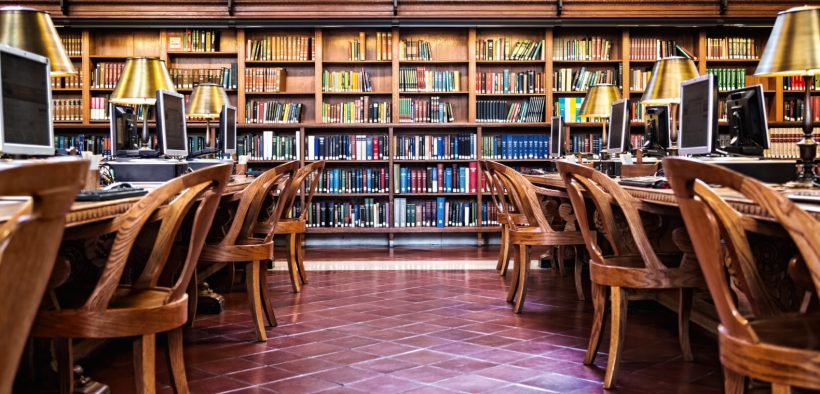Assigned short papers with research and application components expose students to the analytical process of research and writing; too often, however, students turn in papers without any appropriate or reliable sources. We have noted in recent years that college students’ abilities to distinguish appropriate academic articles from other internet resources have diminished. In a resource-rich environment such as the one found on a college campus, connecting students to appropriate peer-reviewed materials that may challenge their beliefs can be complicated. Often, students reach for Google as their first source in collecting information, and they never make it past websites that agree with their positions or that offer little to no critique of theories or propositions.
Collaborating with a research librarian is a great way to “mind the gap.” Librarians can offer a classroom session to help students find peer-reviewed materials. Additionally, librarians can provide you and your students with an online research guide geared toward a specific assignment.
Parameters to decide before you contact the librarian
- What is the goal of the assignment (e.g., to produce an argumentative paper, a memo, original research)?
- What is acceptable research to cite? For example, what type of authority do you want (peer-reviewed journal articles, law review articles, government publications, blogs, etc.)?
- Are there databases to stay away from? For instance, scientific journals are hard for many undergraduates to navigate; law reviews are generally not peer reviewed.
- Are there limiters to the research (e.g., date or geographic limits)?
Collaborating with the librarian
- Request an in-class or online synchronous session.
- If you are requesting a library session, schedule it about a month before the due date or about when you expect the students to start.
- If you also desire a work session, schedule it about two weeks before the assignment is due. These sessions do not need to be the entire class time but can be the last half hour or hour. They are opportunities to work with students who need the help to overcome paralysis or shyness to see you or the librarian individually.
- Request a research guide or learning object (PowerPoint, PDF, or video) tailored to the assignment. Potential guide topics:
- Library databases and collections
- Relevant government information
- Open-access materials
- Methods for searching social media sites such as Twitter to find relevant arguments and authors in the subject
Delivering the research session(s)
Student instruction can be offered both synchronously and asynchronously through a PDF or short recording. We offered students synchronous instruction during which they started the assignment. In this session, the students filled out a Google Form that walked them through the initial steps of the assignment: they chose from a list of programs, chose potential theories to explain why the program worked, and found two peer-reviewed articles about the programs. The Google Form was ungraded but helped to ensure students were on the right track. Students gained confidence and efficacy in the process by demystifying the research process.
We introduced a second research session to allow students time to work on their papers with both of us in the room. If students became stuck, they had immediate access to help. We encouraged them to attend the session based on the feedback from their Google Forms. In the prior semester, students did not independently follow up with either of us on the feedback. By adding this work session, students had a designated time to have more individualized attention as they dove into the assignment.
Investment
Be prepared to continue to change and refine the Google Form and research guide based on assignments turned in and feedback from students. Consider the research guides and Google forms living documents that you can adjust to changes in the assignment or the learning environment as needed. For example, in the first iteration of the assignment, students struggled with two programs in both the application and research components. In the second iteration, we eliminated those programs. Additionally, we changed the Google Form to bring sharper focus to publication dates.
We estimate that between our meetings on the assignment parameters and refining of the research guide and Google form, we devoted no more than four hours each. Prior to the guide, about a third of the students used at least one nonacademic and unreliable source from the internet (for example, students used random blogs that were not based on reliable or valid information.) At least 10 percent did not use any scholarly or academic references at all. After we implemented the guide, fewer students turned in papers without any academic sources. Additionally, students used the sources better, pulling out the relevant data from the articles and using it as evidence in their papers. The improvement was worth our time commitment.
Additional thoughts
- Do research guides work for every subject area? We found in our work together as a criminal justice professor and a public affairs librarian that humanities research guides can certainly be approached as a team effort. Even in the hardest of the sciences, students can use the help of a research guide for assignments with specific parameters. We are aware of a similar assignment at our institution for Biology Lab 151 that anecdotal data suggests has been extremely well received.
- This suggestion would not work at institutions with low or no library support. This challenge is due less to a lack of interest on librarians’ part than to a simple lack of resources. At many institutions, however, librarians can and will work with you to create whatever wayfinding resources you need to help students access the materials the library has to offer.
Conclusion
By designing an assignment and collaborating with the subject librarian, students experience guided research and analytical assignment in their designated field. This theory course is required and usually taken by sophomores and juniors. Therefore, this way of “narrowing their playing field” allows students to use search skills in a highly targeted way, which seems to appeal to their need for choosing topics that are relevant to them while having guidance from you and the librarian to prevent generalized paralysis and floundering when they are faced with the vast resources at hand. We find that students are naturally curious and want to learn. They seek to understand the academic arguments being made around and to them. Librarians want to help you help your students. Reach out to your library and find out what resources are available to you.
Stephani Rodgers, MA, MLIS, is a public affairs librarian at Cabell Library, Virginia Commonwealth University. She is library liaison to several departments on campus, including Criminal Justice, Homeland Security and Emergency Preparedness, Public Policy, Political Science, and Journalism.
Kristine Artello, JD, PhD, MSSA, is a visiting associate professor and interdisciplinary scholar and practitioner in Metropolitan College at Boston University. Her work broadly examines how behaviors or events become defined and characterized in legal realms and policy.






